Why Early Diagnosis matters in Liver Disease Recovery
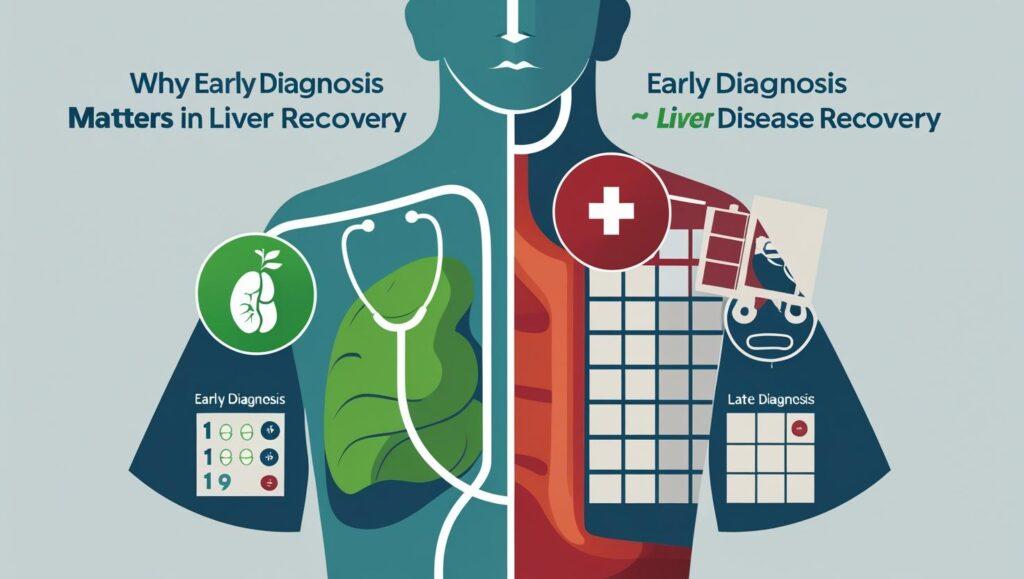
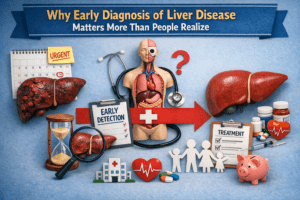 Why Early Diagnosis of Liver Disease Matters More Than People Realize
Why Early Diagnosis of Liver Disease Matters More Than People Realize
Most of us don’t think about our liver on a daily basis. It quietly does its job in the background – cleaning the blood, processing nutrients, balancing hormones, helping digestion. No pain, no noise, no obvious signals. And that’s exactly the problem.
Liver disease often grows in silence.
Doctors frequently talk about the liver as a “forgiving organ” because it can function even when partially damaged. But that forgiveness comes at a cost. By the time symptoms finally appear, the damage is often already serious. This is why early diagnosis of liver disease can quite literally change the course of someone’s life.
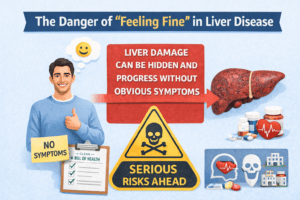
The danger of “feeling fine” in liver disease
One of the most common things people say after a diagnosis is, “But I felt completely normal.”
A schoolteacher in her early forties once shared that she only went for tests because her company offered free annual checkups. No pain, no fatigue she considered unusual, no warning signs. Her blood reports showed elevated liver enzymes. Further testing revealed early-stage fatty liver. She admitted later that if not for that routine test, she would have ignored it for years.
This is not rare. Fatty liver, early hepatitis, even fibrosis can exist for a long time without dramatic symptoms. The body adapts. People adjust. Mild tiredness is blamed on work stress. Bloating is blamed on food. Sleep problems are blamed on screens. The liver continues to struggle quietly.
Early detection is the only bridge between “I feel fine” and preventing “I wish I had known sooner.”
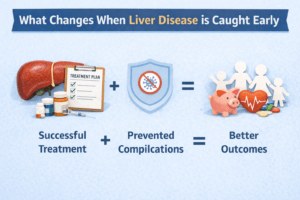
What changes when liver disease is caught early
The difference between early diagnosis and late diagnosis is not just medical — it’s deeply personal.
When liver issues are caught early, the approach is often simple and realistic. Lifestyle changes. Dietary adjustments. Regular walks. Cutting back on alcohol. Managing diabetes better. Sometimes medication. Often, nothing extreme.
A young father diagnosed with early-stage MASLD described it honestly:
“I didn’t need surgery. I didn’t need hospitalization. I just needed awareness. I started walking after dinner, stopped late-night junk food, lost 8 kilos slowly. Six months later, my reports improved. That’s when it hit me — I was lucky we caught it early.”
Compare this to advanced liver disease, where people talk about frequent hospital visits, fluid in the abdomen, confusion episodes, transplant discussions, financial stress, and emotional burnout for families. The contrast is stark.
Early diagnosis doesn’t just improve medical outcomes. It preserves quality of life.
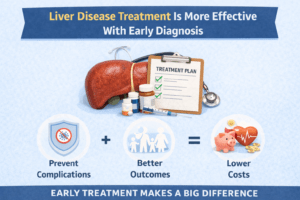
Liver Disease Treatment Is More Effective With Early Diagnosis
Doctors consistently see better responses in patients diagnosed early.
Hepatitis B and C respond far better to antiviral treatments before cirrhosis develops. Fatty liver often reverses when addressed in the early stages. Even fibrosis, once considered permanent, can sometimes improve if caught early enough and managed well.
People often underestimate how powerful small changes can be when started early. A nutritionist once put it simply:
“Early liver disease responds to consistency, not perfection.”
That’s reassuring for most people. You don’t need a perfect diet. You need sustainable habits — started early.
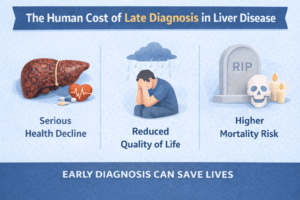
The human cost of late diagnosis in liver disease
There are also the difficult stories. People who ignored mild symptoms. People who postponed checkups because life felt too busy. People who assumed liver problems only happen to heavy drinkers.
A businessman in his fifties once said during a support group session:
“I thought liver disease was for alcoholics. I barely drank. But I had diabetes, belly fat, and stress for years. By the time I checked, I had cirrhosis.”
His experience reflects a widespread misunderstanding. Liver disease today is often driven by metabolic health, not just alcohol. Sedentary lifestyle, processed food, insulin resistance, and obesity play a huge role. And because the awareness is low, screening is often delayed.
Simple Screening Tools That Improve Early Detection of Liver Disease
What makes this situation even more frustrating is that early diagnosis doesn’t usually require complicated procedures.
A simple liver function blood test. 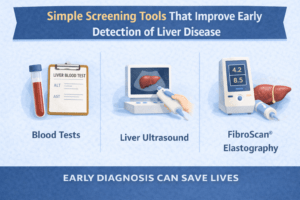 An ultrasound.
An ultrasound.
A FibroScan in some cases.
Basic hepatitis screening.
These are not exotic tools. They’re widely available. Yet many people go years without ever checking their liver health, especially if they don’t feel “sick enough.”
Several general physicians admit that routine liver screening is still not emphasized enough in standard health conversations. That needs to change.
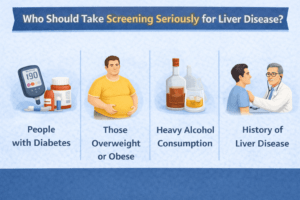
Who should take screening seriously for liver disease?
From real-world clinical experience, certain patterns keep showing up:
People with diabetes who were never told to monitor liver health
Young adults with obesity who assumed fatty liver is “harmless”
Women with PCOS who developed fatty liver silently
Middle-aged professionals with desk jobs and high stress
People who never drank but had high cholesterol for years
The common thread is not lifestyle extremes — it’s long-term neglect of subtle risk factors.
If someone has diabetes, obesity, high cholesterol, family history of liver disease, past hepatitis exposure, or regular alcohol use, screening should not be optional. It should be routine.
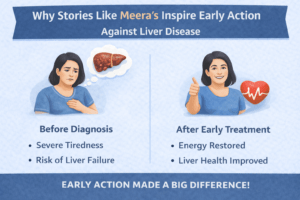
Why Stories Like Meera’s Inspire Early Action Against Liver Disease
Stories like Meera’s — where a routine test caught early fatty liver and lifestyle changes reversed the condition — are not just motivational. They are realistic.
Many people have quietly improved their liver health after early diagnosis. They just don’t talk about it publicly because recovery stories don’t feel dramatic. No hospital drama. No visible scars. Just steady improvement over months.
But those are exactly the stories worth amplifying. They prove that early diagnosis works.
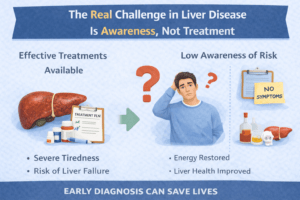
The Real Challenge in Liver Disease Is Awareness, Not Treatment
The biggest barrier today isn’t lack of treatment. It’s lack of urgency.
People postpone tests because they feel okay.
Doctors sometimes focus more on sugar and cholesterol than liver.
Families don’t discuss liver health unless someone is already ill.
This creates a culture of late discovery.
Early diagnosis of liver disease needs to become as normal as checking blood pressure or blood sugar.
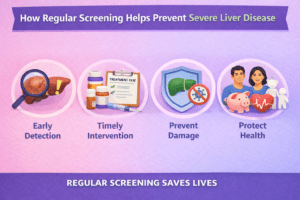
How Regular Screening Helps Prevent Severe Liver Disease
Liver disease doesn’t announce itself loudly. It grows quietly. But the opportunity to prevent it is also quiet and simple: routine tests, timely attention, informed habits.
No drama. Just awareness.
If more people tested earlier, many hospital wards would be less crowded. Many families would avoid emotional and financial strain. Many lives would unfold differently.
Sometimes, the most powerful health decision is not a big one. It’s just booking a simple blood test before something feels wrong.
And that one small step can make all the difference.
